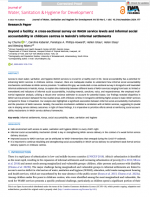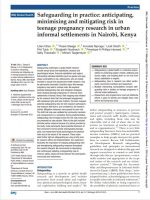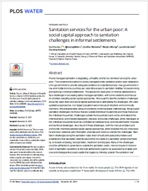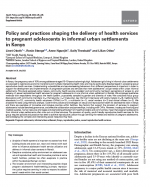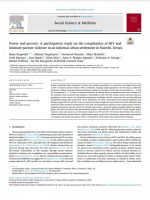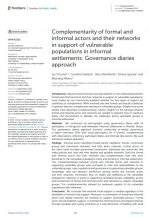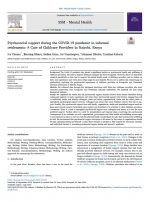Abstract Access to clean water, sanitation, and hygiene (WASH) services is crucial for a healthy start in life. Social accountability has a potential for enhancing WASH services in childcare centres. However, there are inadequate studies to understand how informal social accountability mechanisms contributes to WASH service provision. To address this gap, we conducted a cross-sectional […]
Abstract This article critically reviews the literature on urban informality, inequity, health, well-being and accountability to identify key conceptual, methodological and empirical gaps in academic and policy discourses. We argue that critical attention to power dynamics is often a key missing element in these discourses and make the case for explicit attention to the operation […]
Abstract Safeguarding challenges in global health research include sexual abuse and exploitation, physical and psychological abuse, financial exploitation and neglect. Intersecting individual identities (such as gender and age) shape vulnerability to risk. Adolescents, who are widely included in sexual and reproductive health research, may be particularly vulnerable. Sensitive topics like teenage pregnancy may lead to […]
Abstract Poorly managed sanitation is degrading, unhealthy and far too dominant among the urban poor. The conventional solution to poorly managed onsite sanitation and/or open defecation is for governments to provide adequate sanitation at subsidised prices. Few governments in low and middle income countries can subsidise access to sanitation facilities for people living and working […]
In Kenya, the pregnancy rate of 15% among adolescents aged 15–19 years is alarmingly high. Adolescent girls living in informal urban settlements are exposed to rapid socio-economic transitions and multiple intersecting health risks and may be particularly disadvantaged in accessing sexual reproductive health services. Understanding vulnerabilities and service-seeking behaviours from different perspectives is important in order […]
Abstract People in informal urban settlements in Kenya face multiple inequalities, yet researchers investigate issues such as HIV or intimate partner violence (IPV) in isolation, targeting single populations and focusing on individual behaviour, without involving informal settlement dwellers. We formed a study team of researchers (n = 4) and lay investigators (n = 11) from an informal settlement in Nairobi, Kenya to […]
Beyond several interests and speculations on the relationship between formal and informal actors and their networks in support of vulnerable populations, most studies do not conclusively establish whether the two types of support are substitutes or complements. While informal care and formal care may be substitutes in general, they are complements among the vulnerable groups. […]
The COVID-19 pandemic has placed a significant burden on psychosocial health and wellbeing of childcare providers. The need to support childcare managers has been recognized. However, there is to date little research specifically on how best to support the mental health needs of childcare providers, and no studies on their own experiences and views about what might be […]
Worldwide, infrastructure expansion and visions of ‘slum-free cities’ displace people living in informal settlements. Without community participation in these processes and accountability mechanisms in place’ such displacement can adversely impact people’s health and well-being. This piece outlines SPARC’s (Society For Promotion of Area Resource Centres, SPARC is an NGO based in India promoting action of […]
Introduction One of the major challenges that persons with disabilities (PWDs) are facing globally is unemployment. The challenge is attributed to systems that are not built with inclusivity in mind by employers. As such, the work of inclusion is not inviting PWDs to do more but to make a difference through social support. Most research […]
